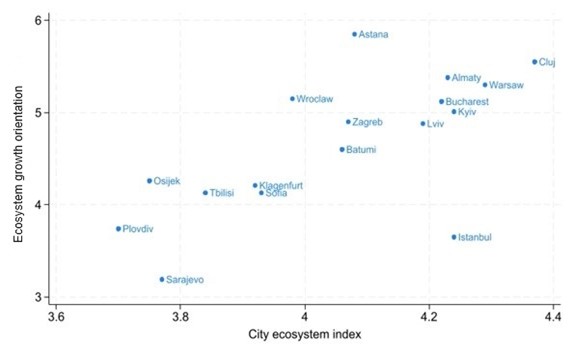The concept of ‘entrepreneurial ecosystem’ is gaining popularity in regional studies. Under this label, we find various conditions and policies that either support or inhibit local entrepreneurship, especially its most dynamic variety – innovative and growth-oriented new firms.
In our ongoing research, we ask if the city ecosystem characteristics that support dynamic entrepreneurship are consistent or in conflict with the ecosystem features that assist the green transition, especially as the latter is an objective that continues to gain prominence, given the increasing challenges of climate change and growing social awareness of the issue.
We investigated this question empirically by conducting a survey of ‘ecosystem actors’ that are entrepreneurs, providers of finance, those involved in knowledge creation, and local policymakers. The survey was implemented in seventeen cities in Europe and Central Asia; in each of them, we collected at least one hundred interviews. We were interested in finding out how those local ecosystem participants perceive the conditions for entrepreneurship and local green orientation of policies and institutions. We also plug in objective indicators of the local economy, society, and policy into our regressions. We run the latter to evaluate the associations between different characteristics of the city ecosystems and the outcome variable, which is city orientation on dynamic entrepreneurship.
What we found out looks optimistic. In particular, our results suggest that entrepreneurial dynamism is strong when entrepreneurs have an awareness of the importance of sustainable behavior, maintain energy efficiency, recycle, and engage in strategies that account for climate change. It seems to us, therefore, that environmentally sustainable business is not only consistent with dynamism and growth but, in fact, both aspects reinforce each other.
Why is that? One reason may be that a lot of cutting-edge innovation and the emergence of new business opportunities are taking place in the area of green transformation. However, more subtle channels may link an emphasis on sustainable development to dynamic entrepreneurship. Success in entrepreneurship is a complex product of both strong individualist drive and ambition and securing the cooperation of other people, who help new firms access required resources, finance, and knowledge, buy their new products, and come with needed supplies. All this implies that local community ties nurture successful entrepreneurship. Accepting green objectives shared between entrepreneurs and the local community helps to make this social cooperation stronger, supporting entrepreneurial dynamism.
After running our econometric estimations, we went back to the data and aggregated it to the city level. We were able to order our cities according to two dimensions, which are illustrated in Figure 1. The vertical dimension refers to the entrepreneurial ecosystem growth orientation, which is the outcome we are interested in. The horizontal dimension combines various aspects of the ecosystem that we consider as associated with its quality. Sustainable entrepreneurship is one of them, but we also included the local cultural dimension (especially positive references to entrepreneurship in media) and supportive local government policies. The results are presented below.

Similar to our results based on microdata, we found a pattern of positive correlation between growth orientation and ecosystem quality index. But probably the most interesting finding is which city comes at the top along the ecosystem quality dimension. It is the city of Cluj.

Its Climate City Contract was one of the only ten approved by the European Commission (as of 2023). Cluj combines successfully the emphasis on technology-based entrepreneurship, close cooperation with knowledge centres, and the overall strategy of sustainable city development. In short, it demonstrates that green can be dynamic and successful at the same time.
This blog is a summary adaptation of the paper “City-level Institutions and Perceived Entrepreneurial Ecosystem’s Growth Orientation.” Click here to read more.
Acknowledgement: The authors are indebted to the participants of the London Winter Conference of RSA for great comments and suggestions.
Disclaimer: There is no conflict of Interest.
Authors

Tomasz Mickiewicz is a senior fellow of the Regional Studies Association, a former editor of the Regional Studies journal, and a current editor of Entrepreneurship Theory and Practice. He works as a professor of economics at Aston University (Birmingham) and is a member of its Centre for Business Performance. He is also a member of the UK team of Global Entrepreneurship Monitor and an honorary senior research fellow at University College London. He publishes on regional economics, institutional economics, and entrepreneurship.
![]() : @tomekmickiewicz.bsky.social
: @tomekmickiewicz.bsky.social ![]() : Tomasz Mickiewicz
: Tomasz Mickiewicz ![]() : 0000-0001-5261-5662
: 0000-0001-5261-5662

Maksim Belitski is a Professor of Entrepreneurship at Henley Business School, University of Reading, UK, and a Research Fellow at the Institute for Development Strategies, Indiana University, US. He earned a PhD in Social Sciences from the University of Leicester, UK, and another PhD in Economics from the University of Milan, Italy. His current research interests encompass product, process, service, and organizational innovation; the geographic influence on entrepreneurship and innovation; financing mechanisms for entrepreneurship; knowledge spillovers in innovation and entrepreneurship; academic entrepreneurship and the commercialization; development of entrepreneurship ecosystems, associated policies, and measurements. He serves as an Editor for the Small Business Economics Journal and Journal of Business Research.
![]() : Maksim Belitski
: Maksim Belitski ![]() : 0009-0009-7388-4381
: 0009-0009-7388-4381

Georg M. Eichler holds a PhD in economics and management from the University of Klagenfurt (Austria). His main research areas are (social) entrepreneurship, entrepreneurial ecosystems, nascent entrepreneurship, and business model transformation. Additionally, he has vast expertise in the development of ecosystems to promote social innovation. Thanks to his current position in the Klagenfurt city administration as a project manager, he has extensive experience in the fields of smart city development and the transformation of cities towards climate neutrality.